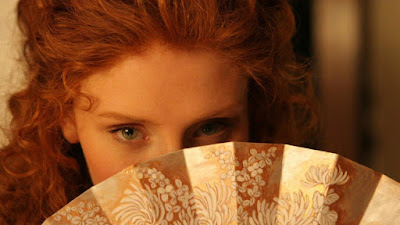Can a mere playwright -- God though he seems upon the stage -- write a play in which everything about plays can be freshly tested, intertwined, and 'measured'? Might there be a comedy without a marriage, a history without history, a tragedy without a death? Measure for Measure is Shakespeare's answer to all these questions, and his most taut and hazardous experiment, one in which the license of the stage itself -- for the Globe was in the suburbs, the 'liberties' of London -- is called into question.
Here, even more so than in As You Like It, we have a plethora of motifs -- the disguised Duke, the untested ruler, the faithful retainer, the bawds and tapsters (and judges and magistrates) of every other play he ever wrote, all bundled into one. The issue at the center of it all is justice, and its application -- and it's not just Angelo who will be sorely tested. And, with Isabella, Shakespeare gives us his the most compelling and eloquent of all his female characters, one who, though initially reluctantly, will so challenge Angelo's justice that she wins all hearts, including -- unwittingly -- his.
'Judge not, that ye be not judged, and with what measure ye mete, it shall be measured to you againe" -- in this abjuration seems to lie the title and the whole matter of the play. And indeed, the language is that of the King James Bible, s first published in 1611, just six years or so after the play (though the phrasing of the line is nearly the same as Tyndale's translation of 1526, and Shakespeare would doubtless have been familiar with it from his youth).
Here, even more so than in As You Like It, we have a plethora of motifs -- the disguised Duke, the untested ruler, the faithful retainer, the bawds and tapsters (and judges and magistrates) of every other play he ever wrote, all bundled into one. The issue at the center of it all is justice, and its application -- and it's not just Angelo who will be sorely tested. And, with Isabella, Shakespeare gives us his the most compelling and eloquent of all his female characters, one who, though initially reluctantly, will so challenge Angelo's justice that she wins all hearts, including -- unwittingly -- his.
'Judge not, that ye be not judged, and with what measure ye mete, it shall be measured to you againe" -- in this abjuration seems to lie the title and the whole matter of the play. And indeed, the language is that of the King James Bible, s first published in 1611, just six years or so after the play (though the phrasing of the line is nearly the same as Tyndale's translation of 1526, and Shakespeare would doubtless have been familiar with it from his youth).

